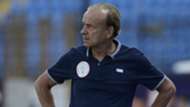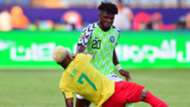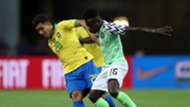
Ahead of the second meeting with the Indomitable Lions, it may be all Super Eagles boss Gernot Rohr can do to even field a coherent starting 11
Four days on from their last assignation, the national teams of Cameroon and Nigeria will renew their acquaintance in Tuesday’s friendly in Austria.
The setting is the same, as are the circumstances. Which begs the question: why exactly are we doing this again?
It is the sequel no one asked for, less so considering even the first was not enthusiastically received.
Following injuries to William Troost-Ekong and Jamilu Collins, the Nigeria end is also now depleted, complicating matters further and shining an even harsher light on the paucity of playing personnel within the Super Eagles selection.
With that in mind, it is both understandable and entirely depressing that little-known Vincent Onovo, based out of seventh-placed Hungarian side Ujpest, joined the squad ahead of this re-run.

The 25-year-old journeyman defensive midfielder is an unwelcome call-back to darker days in the early to mid-2000s, when inadequate friendly (or, sometimes, even competitive) squads were padded out by random players whose only claims were proximity to the site and the possession of a Nigerian passport.
It is also rather unhelpful – and frankly amusing – that he has been brought into the fold when the major headache the coaching crew has been trying to solve is a dearth of defenders. Is that a marker of Onovo’s willingness to help the team in any capacity (yay for patriotism!), or simply further proof no one knows who or what he even is to begin with, beyond another warm body?
Both, maybe?
It all just adds to the sense of dysfunction, and heightens the feeling that perhaps this international window should have been left blank.
An unpopular proposition it would have been, granted, but is this any better?
What are the wider gains that will have been gleaned by the end of this pair of matches?
That was rhetorical; there are, however, clear downsides, not least of which is the loss of goodwill from the players themselves, who would almost certainly much rather be resting sore limbs and tired minds. Why not give them the window off, instead of rousing them for this train wreck? They might have actually thanked the NFF for the consideration.

As is, based on how events have shaken out, the Super Eagles will step out for their return leg against Cameroon with a central defence featuring, in Valentine Ozornwafor, a player who played a grand total of eight minutes of club football this past season.
Mercifully, the callow and undeniably match-rusty former U-20 international will have the vast experience of Chidozie Awaziem (a mere two years his senior) and another late entrant in Anthony Izuchukwu (zero senior international caps) to guide him through a testing encounter.
What is the great lesson or revelation that Rohr is supposed to receive here?
Everyone fit and available, none of these three players would start for the national team anyway, so what is the point of the entire exercise?

The absence of a left-back to deputize for Collins necessitates a shift to a wing-back system which will require some creative shoehorning, perhaps with Moses Simon adopting a deeper starting position than in the first match.
Unfortunate, considering he was the team’s standout performer in the first game.
One would have to assume that, after a gruelling season, the likes of Kelechi Iheanacho, Paul Onuachu and Wilfred Ndidi would not be expected to start the second time around, so: Peter Olayinka, Terem Moffi and (yet another graft) Samson Tijani? What happens at right wing-back then?
If it isn’t obvious, at this point it is less about giving players a chance to prove themselves as it is putting out a line-up with any kind of coherence or underpinning logic…and that, ultimately, undermines the entire utility of the exercise.

Be the first to comment